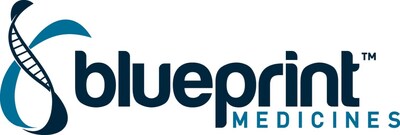Blueprint Medicines Highlights AYVAKIT® (avapritinib) Long-Term Efficacy and Safety Data and Advances in Mast Cell Disease Research at 2024 AAAAI Annual Meeting
-- AYVAKIT data in patients with indolent systemic mastocytosis show durable efficacy and favorable safety supporting long-term treatment, consistent with real-world experience observed in commercial setting --
-- Preclinical data for BLU-808, a highly selective and potent oral wild-type KIT inhibitor with best-in-class potential, supports development in chronic urticaria and other mast cell diseases; on track to submit IND to FDA in Q2 2024 --
-- Breadth of data across 9 presentations, including 2 oral, highlight scientific and clinical leadership --
"PIONEER data show that long-term treatment with AYVAKIT led to robust and durable clinical efficacy across a wide range of symptoms, and a well-tolerated safety profile that has remained remarkably consistent over time," said Becker Hewes, M.D., Chief Medical Officer at Blueprint Medicines. "These compelling long-term data, combined with the real-world experience of more than a thousand patients currently on therapy in the
AYVAKIT: Durable Symptom Impact and Well-Tolerated Safety Profile in Patients with ISM
Long-term data from the PIONEER trial show that AYVAKIT led to robust improvements across all symptom domains (skin, gastrointestinal, neurocognitive) at 24 weeks, with sustained benefits through 48 weeks. In addition, patients treated with placebo during the blinded portion of the trial had rapid and durable symptom improvements upon cross-over to AYVAKIT. Symptom improvements were assessed by the validated Indolent Systemic Mastocytosis Symptom Assessment Form (ISM-SAF). After 48 weeks of treatment with AYVAKIT, 35 percent of patients reduced or discontinued use of best supportive care medicines. As of the updated data cut, the last patient treated with AYVAKIT in the blinded portion of the trial reached the 48-week timepoint.
With a median patient follow-up of 18 months, the safety profile of AYVAKIT was consistent with previously reported results from the 6-month placebo-controlled portion of the trial, with no new safety signals observed. Most adverse events (AEs) were mild or moderate (Grade 1-2), and the most common treatment-related AEs (≥5 percent) were peripheral edema, headache, periorbital edema and nausea. The rate of treatment-related AEs leading to discontinuation remained low (3 percent).
BLU-808: An Investigational, Potent and Selective Wild-type KIT Inhibitor for Chronic Urticaria and Other Mast Cell Diseases
Mast cells play a critical frontline role in a healthy immune response; activation through KIT and other receptors leads to degranulation and release of downstream effectors that mediate inflammation. However, when mast cells are dysregulated, they are drivers of multiple common allergic and inflammatory diseases such as chronic urticaria, for which wild-type KIT is a clinically validated therapeutic target. BLU-808 is an investigational, highly selective and potent oral wild-type KIT inhibitor designed to enable tolerability and flexibility to tailor treatment based on disease severity and patient needs.
"The development of BLU-808 is another example of our proven track record of designing exquisitely selective molecules that inhibit important biologic targets. Specifically, our scientists engineered BLU-808 to potently target wild-type KIT, while maintaining a wide therapeutic index conducive to chronic treatment," said Percy Carter, Ph.D., Chief Scientific Officer at Blueprint Medicines. "The BLU-808 program highlights our focused efforts to scale our science in allergy/inflammation, leveraging our expertise in mast cell biology and fully integrated R&D and commercial capabilities. By targeting the root cause of a variety of inflammatory diseases, BLU-808 represents a potential best-in-class mast cell modulator that may benefit large patient populations with high medical needs."
In foundational preclinical data reported at AAAAI, BLU-808 demonstrated a best-in-class selectivity and potency profile in vitro. In multiple in vivo studies, BLU-808 treatment led to dose-dependent inhibition and depletion of mast cells. In addition, BLU-808 improved lung function in an ovalbumin-induced asthma model. Based on these data, Blueprint Medicines expects to submit an investigational new drug application for BLU-808 in the second quarter of 2024, and subsequently plans to initiate a Phase 1 study in healthy volunteers. The initial development focus for BLU-808 will be in chronic urticaria.
Blueprint Medicines' AAAAI data presentations are listed below. Copies of the data presentations are available in the "Science—Publications and Presentations" section of the company's website at www.BlueprintMedicines.com.
Data Presentations
Presentation Title: BLU-808, a Potent and Selective Small Molecule Inhibitor of Wild-type c-KIT for Mast Cell Disorders
Session Title: Novel Treatment Approaches in Allergic Disease, Poster Session
Session Date & Time: Friday, February 23 from 3:15 – 4:15 p.m. ET
Abstract Number: 189
Location: Convention Center, Level 2, Hall D
Presentation Title: Patient-Reported Outcome Measures in Systemic Mastocytosis: A Systematic Review
Session Title: Mast Cell Disorders, Poster Session
Session Date & Time: Sunday, February 25 from 9:45 – 10:45 a.m. ET
Abstract Number: 689
Location: Convention Center, Level 2, Hall D
Presentation Title: Reductions in Polypharmacy for Patients with Indolent Systemic Mastocytosis on Avapritinib
Session Title: Mast Cell Disorders, Poster Session
Session Date & Time: Sunday, February 25 from 9:45 – 10:45 a.m. ET
Abstract Number: 696
Location: Convention Center, Level 2, Hall D
Presentation Title: Systemic Mastocytosis: Shedding Light on a Rare and Complicated Disease
Session Title: Mast Cell Disorders, Poster Session
Session Date & Time: Sunday, February 25 from 9:45 – 10:45 a.m. ET
Abstract Number: 691
Location: Convention Center, Level 2, Hall D
Presentation Title: The Five Dimensions of the ISM Patient Experience – Uncovering the "Real-world" Experience of Patients with Indolent Systemic Mastocytosis
Session Title: Mast Cell Disorders, Poster Session
Session Date & Time: Sunday, February 25 from 9:45 – 10:45 a.m. ET
Abstract Number: 693
Location: Convention Center, Level 2, Hall D
Presentation Title: Quantifying Diagnostic Delays in Patients with Indolent and Aggressive Systemic Mastocytosis
Session Title: Mast Cell Disorders, Poster Session
Session Date & Time: Sunday, February 25 from 9:45 – 10:45 a.m. ET
Abstract Number: 692
Location: Convention Center, Level 2, Hall D
Oral Presentation Title: Exploring the Spectrum of Indolent Systemic Mastocytosis: Analysis of High-Risk Disease Features in the PIONEER Study
Session Title: Mast Cell Disorders: Bench to Bedside, Oral Abstract Session
Session Date & Time: Sunday, February 25 from 2:15 – 2:25 p.m. ET
Abstract Number: 737
Location: Convention Center, Level 1, Room 144B
Oral Presentation Title: Prevalence of The KIT D816V Mutation In Peripheral Blood (PB) of Patients With Evidence of Systemic Mast Cell Activation (MCA): Results of The Prospective, Multi-centered, Global PROSPECTOR Clinical Trial
Session Title: Mast Cell Disorders: Bench to Bedside, Oral Abstract Session
Session Date & Time: Sunday, February 25 from 2:25 – 2:35 p.m. ET
Abstract Number: 739
Location: Convention Center, Level 1, Room 144B
Presentation Title: Avapritinib Decreased Symptom Burden in Patients with Indolent Systemic Mastocytosis in the Registrational Double-Blind, Placebo-Controlled PIONEER Study
Session Title: Novel Cellular and Molecular Pathways of Allergic Inflammation, Featured Poster Session
Session Date & Time: Sunday, February 25 from 4:45 – 6:15 p.m. ET
Abstract Number: 783
Location: Convention Center, Level 3, Ballroom South Prefunction
About Systemic Mastocytosis
Systemic mastocytosis (SM) is a rare disease driven by the KIT D816V mutation in about 95 percent of cases. Uncontrolled proliferation and activation of mast cells result in chronic, severe and often unpredictable symptoms across multiple organ systems. The vast majority of those affected have indolent systemic mastocytosis (ISM). A broad range of symptoms, including anaphylaxis, maculopapular rash, pruritis, diarrhea, brain fog, fatigue and bone pain, frequently persist in patients with ISM despite treatment with multiple symptom-directed therapies. This burden of disease can lead to a profound, negative impact on quality of life. Patients often live in fear of severe, unexpected symptoms, have limited ability to work or perform daily activities, and isolate themselves to protect against unpredictable triggers. Historically, there had been no approved therapies for the treatment of ISM.
A minority of patients have advanced SM, which encompasses a group of high-risk SM subtypes including ASM, SM-AHN and MCL. In addition to mast cell activation symptoms, advanced SM is associated with organ damage due to mast cell infiltration and poor survival.
About AYVAKIT (avapritinib)
AYVAKIT (avapritinib) is approved by the
To learn about ongoing or planned clinical trials, contact Blueprint Medicines at medinfo@blueprintmedicines.com or 1-888-BLU-PRNT (1-888-258-7768). Additional information is available at blueprintclinicaltrials.com or clinicaltrials.gov.
Important Safety Information
Intracranial Hemorrhage—Serious intracranial hemorrhage (ICH) may occur with AYVAKIT treatment; fatal events occurred in <
Monitor patients closely for risk factors of ICH, which may include history of vascular aneurysm, ICH or cerebrovascular accident within the prior year, concomitant use of anticoagulant drugs, or thrombocytopenia.
Symptoms of ICH may include headache, nausea, vomiting, vision changes, or altered mental status. Advise patients to seek immediate medical attention for signs or symptoms of ICH.
Permanently discontinue AYVAKIT if ICH of any grade occurs. In Advanced SM patients, a platelet count must be performed prior to initiating therapy. AYVAKIT is not recommended in Advanced SM patients with platelet counts <50 x 109/L. Following treatment initiation, platelet counts must be performed every 2 weeks for the first 8 weeks. After 8 weeks of treatment, monitor platelet counts every 2 weeks or as clinically indicated based on platelet counts. Manage platelet counts of <50 x 109/L by treatment interruption or dose reduction.
Cognitive Effects—Cognitive adverse reactions can occur in patients receiving AYVAKIT and occurred in
Photosensitivity—AYVAKIT may cause photosensitivity reactions. In all patients treated with AYVAKIT in clinical trials (n=1049), photosensitivity reactions occurred in
Embryo-Fetal Toxicity—AYVAKIT can cause fetal harm when administered to a pregnant woman. Advise pregnant women of the potential risk to a fetus. Advise females and males of reproductive potential to use an effective method of contraception during treatment with AYVAKIT and for 6 weeks after the final dose of AYVAKIT. Advise women not to breastfeed during treatment with AYVAKIT and for 2 weeks after the final dose.
Adverse Reactions—The most common adverse reactions (≥
The most common adverse reactions (≥
Drug Interactions—Avoid coadministration of AYVAKIT with strong or moderate CYP3A inhibitors. If coadministration with a moderate CYP3A inhibitor cannot be avoided in patients with Advanced SM, reduce dose of AYVAKIT. Avoid coadministration of AYVAKIT with strong or moderate CYP3A inducers.
To report suspected adverse reactions, contact Blueprint Medicines Corporation at 1-888-258-7768 or FDA at 1-800-FDA-1088 or http://www.fda.gov/medwatch.
Please click here to see the full Prescribing Information for AYVAKIT.
About Blueprint Medicines
Blueprint Medicines is a fully integrated, commercial-stage, global biopharmaceutical company that invents life-changing medicines in two core, strategic areas of allergy/inflammation and oncology/hematology. We pursue discovery, development, and commercialization of therapies that potently and selectively target known drivers of disease, with focused investment in therapeutic areas where we can leverage our core expertise and business infrastructure to bring scale to our science. We are bringing AYVAKIT®/AYVAKYT® (avapritinib) to people living with systemic mastocytosis (SM) in the
Cautionary Note Regarding Forward-Looking Statements
This press release contains forward-looking statements within the meaning of the Private Securities Litigation Reform Act of 1995, as amended, including, without limitation, statements regarding expectations for the potential benefits of AYVAKIT in treating patients with ISM; Blueprint Medicines' ability to transform treatment across the spectrum of SM; the development of BLU-808 and whether it has best-in-class potential; plans and timing for submitting an IND to the FDA for BLU-808; statements regarding plans and expectations for Blueprint Medicines' current or future approved drugs and drug candidates; the potential benefits of any of Blueprint Medicines' current or future approved drugs or drug candidates in treating patients; and Blueprint Medicines' strategy, goals, business plans and focus. The words "aim," "may," "will," "could," "would," "should," "expect," "plan," "anticipate," "intend," "believe," "estimate," "predict," "project," "potential," "continue," "target" and similar expressions are intended to identify forward-looking statements, although not all forward-looking statements contain these identifying words. Any forward-looking statements in this press release are based on management's current expectations and beliefs and are subject to a number of risks, uncertainties and important factors that may cause actual events or results to differ materially from those expressed or implied by any forward-looking statements contained in this press release, including, without limitation, risks and uncertainties related Blueprint Medicines' ability and plans in continuing to build out and expand a commercial infrastructure, and successfully launching, marketing and selling current or future approved products; Blueprint Medicines' ability to successfully expand the approved indications for AYVAKIT/AYVAKYT or obtain marketing approval for AYVAKIT/AYVAKYT in additional geographies in the future; the delay of any current or planned clinical trials or the development of Blueprint Medicines' current or future drug candidates; Blueprint Medicines' advancement of multiple early-stage efforts; Blueprint Medicines' ability to successfully demonstrate the safety and efficacy of its drug candidates and gain approval of its drug candidates on a timely basis, if at all; the preclinical and clinical results for Blueprint Medicines' drug candidates, which may not support further development of such drug candidates either as monotherapies or in combination with other agents or may impact the anticipated timing of data or regulatory submissions; the timing of the initiation of clinical trials and trial cohorts at clinical trial sites and patient enrollment rates; actions of regulatory agencies, which may affect the initiation, timing and progress of clinical trials; Blueprint Medicines' ability to obtain, maintain and enforce patent and other intellectual property protection for AYVAKIT/AYVAKYT or any drug candidates it is developing; Blueprint Medicines' ability to successfully expand its operations, research platform and portfolio of therapeutic candidates, and the timing and costs thereof; and the success of Blueprint Medicines' current and future collaborations, financing arrangements, partnerships or licensing arrangements. These and other risks and uncertainties are described in greater detail in the section entitled "Risk Factors" in Blueprint Medicines' filings with the Securities and Exchange Commission (SEC), including Blueprint Medicines' most recent Annual Report on Form 10-K, as supplemented by its most recent Quarterly Report on Form 10-Q and any other filings that Blueprint Medicines has made or may make with the SEC in the future. Any forward-looking statements contained in this press release represent Blueprint Medicines' views only as of the date hereof and should not be relied upon as representing its views as of any subsequent date. Except as required by law, Blueprint Medicines explicitly disclaims any obligation to update any forward-looking statements.
Trademarks
Blueprint Medicines, AYVAKIT, AYVAKYT and associated logos are trademarks of Blueprint Medicines Corporation.
![]() View original content to download multimedia:https://www.prnewswire.com/news-releases/blueprint-medicines-highlights-ayvakit-avapritinib-long-term-efficacy-and-safety-data-and-advances-in-mast-cell-disease-research-at-2024-aaaai-annual-meeting-302069445.html
View original content to download multimedia:https://www.prnewswire.com/news-releases/blueprint-medicines-highlights-ayvakit-avapritinib-long-term-efficacy-and-safety-data-and-advances-in-mast-cell-disease-research-at-2024-aaaai-annual-meeting-302069445.html
SOURCE Blueprint Medicines Corporation








